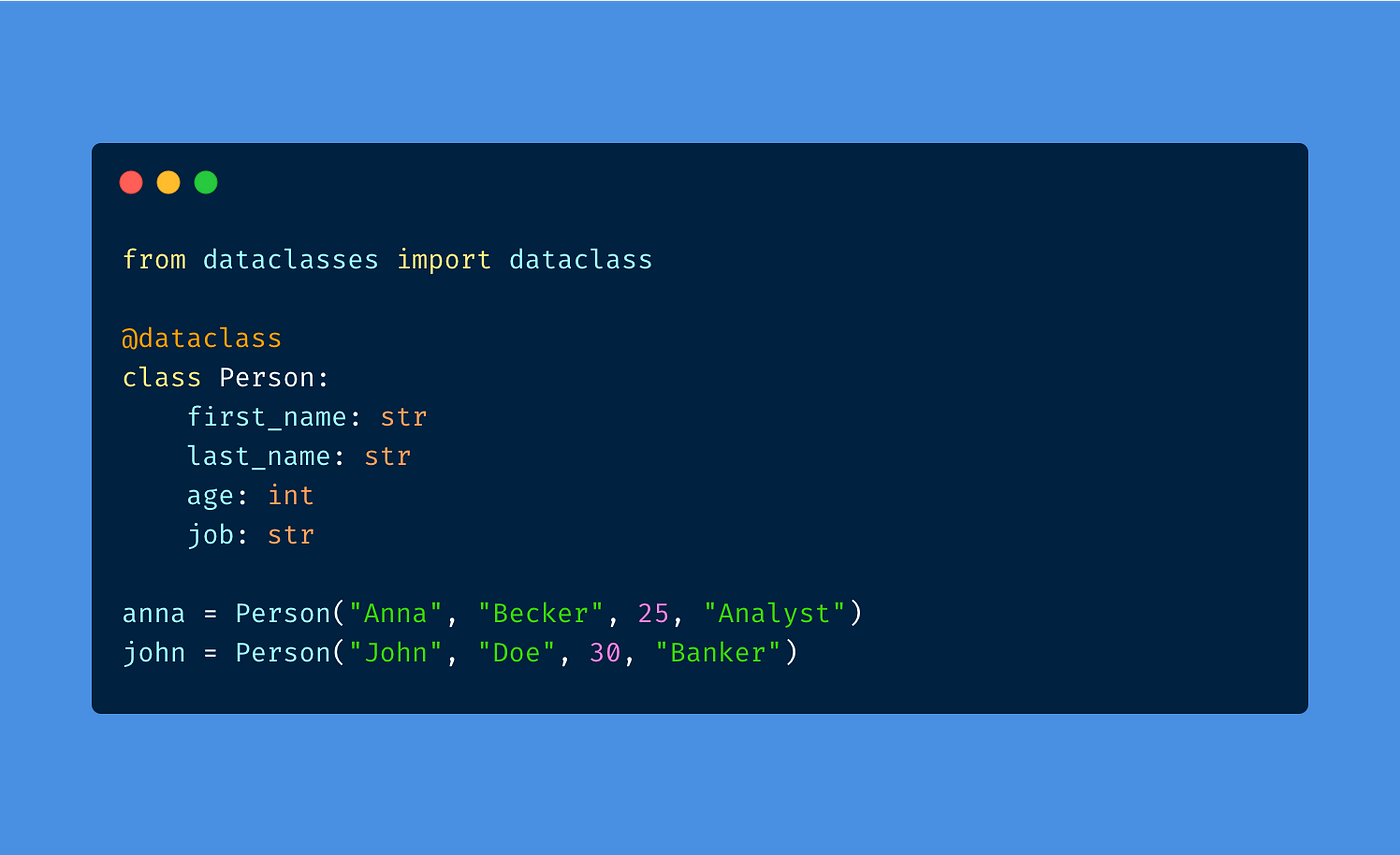Python dataclasses were introduced in Python 3.7. They provide a powerful way to create classes focused on storing data. This guide will explore how dataclasses reduce boilerplate code, enhance readability, and offer powerful features for modern Python development.
Understanding Python Dataclasses
Dataclasses automatically generate special methods like __init__(), __repr__(), and __eq__() for classes that primarily store values. Think of them as Python's way of saying "this class is just for holding data" while automatically adding useful functionality.
Basic Usage
Here's a simple example contrasting traditional classes with dataclasses:
# Traditional class
class TraditionalProduct:
def __init__(self, name, price):
self.name = name
self.price = price
def __repr__(self):
return f"Product(name={self.name!r}, price={self.price!r})"
def __eq__(self, other):
if not isinstance(other, TraditionalProduct):
return NotImplemented
return (self.name, self.price) == (other.name, other.price)
# Dataclass equivalent
from dataclasses import dataclass
@dataclass
class Product:
name: str
price: float@dataclass decorator, you can automatically generate common methods like __init__ for initialization and __repr__ for string representation. This significantly reduces boilerplate code, making your classes more concise and easier to read. Additionally, dataclasses provide automatic equality comparison, further enhancing their convenience for data-centric classes.Key Features
1. Default Values and Field Options
from dataclasses import dataclass, field
from datetime import datetime
@dataclass
class User:
username: str
email: str
created_at: datetime = field(default_factory=datetime.now)
active: bool = True
password: str = field(repr=False) # Excludes password from repr2. Post-Initialization Processing
@dataclass
classCircle:
radius: float
area: float = field(init=False)
def __post_init__(self):
self.area = 3.14159 * self.radius ** 23. Immutable Dataclasses
@dataclass(frozen=True)
class Configuration:
host: str port: int = 8080
debug: bool = False@dataclass(frozen=True) syntax creates an immutable dataclass named Configuration. This means its attributes cannot be modified after the object is created, enhancing data integrity.Advanced Features
1. Inheritance
@dataclass
class Person:
name: str
age: int
@dataclass
class Employee(Person):
salary: float
department: strPerson and Employee classes. Employee inherits attributes from Person (name and age) and adds its own attributes (salary and department).2. Type Validation
from typing import List, Optional
@dataclass
class Team:
name: str
members: List[str]
leader: Optional[str] = None
def __post_init__(self):
if not isinstance(self.members, list):
raise TypeError("members must be a list")Team dataclass uses type hints to enforce data types. It ensures members is a list and leader is an optional string. The __post_init__ method validates the members type and raises an error if it's not a list.3. Custom Comparisons
@dataclass(order=True)
class Priority:
priority: int
name: str = field(compare=False)@dataclass(order=True) syntax creates a Priority dataclass that can be ordered based on its priority attribute. However, the name attribute is excluded from comparison using field(compare=False).Practical Use Cases
1. Configuration Management
@dataclass(frozen=True)
class DatabaseConfig:
host: str
port: int
username:str
password: str = field(repr=False)
pool_size: int = 5
def get_connection_string(self) -> str:
return f"postgresql://{self.username}:xxxxx@{self.host}:{self.port}"DatabaseConfig dataclass (frozen) stores database connection details securely (password is hidden in the string representation). It also provides a method to generate a connection string.2. Data Transfer Objects (DTOs)
@dataclass
class UserDTO:
id: int username: str
email: str
@classmethod
def from_dict(cls, data: dict):
return cls(**data)UserDTO dataclass is designed to transfer user data between layers of an application. It has a class method from_dict to easily create a UserDTO object from a dictionary.3. Value Objects
from decimal import Decimal
@dataclass(frozen=True)
class Money:
amount: Decimal
currency: strdef __add__(self, other):
if not isinstance(other, Money):
return NotImplemented
if self.currency != other.currency:
raise ValueError("Cannot add different currencies") return Money(self.amount + other.amount, self.currency)Money dataclass represents monetary values with an amount and currency. It defines a custom __add__ method to enable addition of Money objects but enforces the same currency for operands.Best Practices
Follow these industries's recommended best practices to get the best of python dataclasses
- Use Type Hints
@dataclass
class Product:
name: str # Good
price: float # Good
quantity: int = 0 # Good with defaultUsing type hints improves code readability and maintainability.
- Immutable When Possible
@dataclass(frozen=True)
class Settings:
api_key: str
timeout: int = 30Immutable dataclasses prevent accidental data modification.
- Handle Mutable Defaults Correctly
@dataclass
class Correct:
items: list = field(default_factory=list) # Good@dataclass
class Wrong:items: list = [] # Bad - shared mutable state!Usefield(default_factory=list)for mutable defaults to avoid creating shared state across instances.
Performance Tips
1. Use Slots for Memory Efficiency
@dataclass(slots=True)
class Point:
x: float
y: float2. Optimize Comparisons
@dataclass
class Record:
id: int
data: dict = field(compare=False) # Skip expensive comparisonsCommon Pitfalls and Solutions
1. Mutable Default Values
# Wrong
@dataclass
class Container:
items: list = [] # DON'T DO THIS
# Right
@dataclass
class Container:
items: list = field(default_factory=list)2. Inheritance Field Order
@dataclass
class Parent:
name: str
@dataclass
class Child(Parent):
age: int # Fields are ordered correctlyIntegration with Other Python Features
1. Pydantic Integration
from pydantic.dataclasses import dataclass
@dataclass
class ValidatedUser:
username: str
age: int
# Pydantic will validate types automaticallydataclasses module can be combined with Pydantic for automatic data validation.2. JSON Serialization
from dataclasses import asdict
import json
@dataclass
class Point:
x: float
y: float
point = Point(1.0, 2.0)
json_data = json.dumps(asdict(point)) asdict function from dataclasses and the json module can be used to easily serialize dataclasses to JSON format.Conclusion
Python dataclasses offer a clean, efficient way to create classes focused on storing data. They reduce boilerplate code, provide powerful features out of the box, and integrate well with Python's type system. By following best practices and understanding their capabilities, you can write more maintainable and efficient Python code.
More Articles from Python Central

